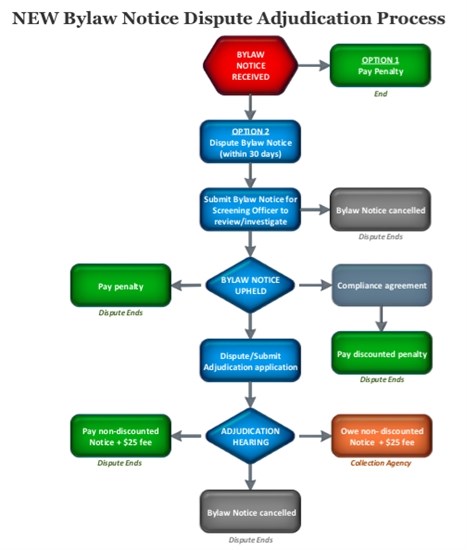
Image Credit: Shutterstock
April 22, 2015 - 1:26 PM
KAMLOOPS - If you receive a bylaw ticket in the Thompson-Nicola Regional District and choose to dispute it, you’ll no longer take it to provincial court. The district gained provincial approval to scrap court visits and bring the debate to a private hearing with an adjudicator instead with the process beginning this month.
Regina Sadilkova, a district director, says the new process will expedite the judicial process and cut down costs on both sides.
“We haven’t changed enforcement and the rules don’t change. It’s just now rather than writing notification letters or pursuing through the court we can simply issue a ticket,” she says.
The district board made the change to the bylaw dispute process almost two years ago, Sadilkova says.
“There is an enactment for local government to undertake bylaw enforcement without going through the provincial court process,” she adds.
The province’s Liberal government amended legislation to change the process. The reason why it took so long to come to the district, Sadilkova says, is because of lengthy applications to B.C.’s Attorney General and a bylaw rewrite.
The choice to move towards an adjudication system over court is a municipality or district choice. Sadilkova says other areas of the province, including the Central Okanagan Regional District, have already changed dispute systems.
Rather than hire lawyers or make attempts to navigate the legal system, Sadilkova says the process is simplified by screening officers who proof dispute paperwork before an adjudicator hearing. Screening officer duties fall on existing staff with no new hires, she adds.
A case can be reviewed - at a $25 non-refundable cost to the disputer - in writing, via Skype, phone or in-person. But unlike court, an adjudicator’s decision is final with no appeal process.
Sadilkova says the adjudicator is yet to be hired through one of two separate firms in the province. Paying for a hearing will come from the municipal budget where the offence occurred. Sadilkova says hearing costs are prescribed based on amount of files and travel costs to bring the adjudicator to the hearing. In many circumstances, if there’s a list of several offences from multiple locations, the cost can be split amongst municipalities, she says.
Sadilkova notes the district switched the system internally, without hiring a consultant. She says adjudication costs are expected to be significantly lower than court fees.
“We pay per hearing and per item, I believe,” she says. "We don’t anticipate we would be having a hearing every month. They don’t even do that in the Central Okanagan (Regional District). It depends how many tickets there are, if they pay them and if people are available."
Removing bylaw tickets from court is not the first instance of removing disputes from the traditional justice system. Amendments to the Motor Vehicle Act plan to remove traffic disputes from the provincial court system, along with the Immediate Roadside Prohibition program. Critics of the changes call the amendments unconstitutional with some lawyers planning to challenge the legislation in court.

The new adjudication process.
Image Credit: Contributed/Thompson-Nicola Regional District
To contact a reporter for this story, email Glynn Brothen at gbrothen@infonews.ca, or call 250-319-7494. To contact the editor, email mjones@infonews.ca or call 250-718-2724.
News from © iNFOnews, 2015